Amber Polo's Blog, page 21
January 23, 2011
Why I Write Fantasy - Joe Vadalma
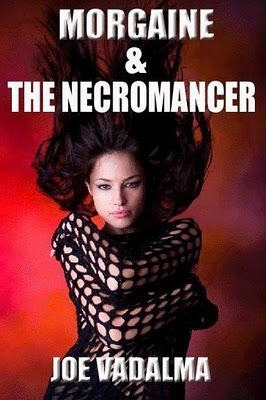 Welcome Joe Vadalma, author of fantasy novels and short stories!
Welcome Joe Vadalma, author of fantasy novels and short stories!Amber: Why do you write fantasy?Joe: I've always loved the fantastic. When I was six or seven years old, my parents took me to see "The Wizard of Oz" with Judy Garland. I read the book and wanted more. As a result, I spent every penny I could scrape up on Oz books, not only by Frank L. Baum, but by Ruth Plumly Thompson and John R. O'Neil.
Mostly, however, I write dark fantasy about witches, demons and vampires. My Morgaine the demon witch series is up to nine novels. I'm also writing a series about a character I created for the Morgaine series. Her name is Raven Lenore, and she is a tough private eye and psychic. I like writing in this genre because of all the possibilities from trips to hell and fairyland, time travel, magic, science fictional concepts, the occult and interesting characters. (I have also written science fiction.)
Amber: What are your favorite fantasy novel?
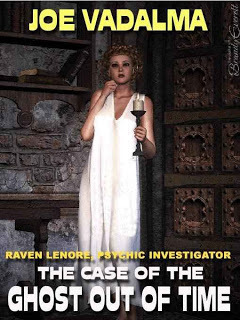 Joe: There are many. I love Pierre Anthony's Xanth series, all the Oz books, anything by H.P. Lovecraft, Lord of the Rings, of course, and novels by Marion Zimmer Bradley, especially The Mists of Avalon.
Joe: There are many. I love Pierre Anthony's Xanth series, all the Oz books, anything by H.P. Lovecraft, Lord of the Rings, of course, and novels by Marion Zimmer Bradley, especially The Mists of Avalon.Amber: Why do you think readers love fantasy? Joe: I believe it is because fantasy takes you away from the humdrum world that most of us live in and into worlds of adventure, magic and mystery.
Amber: Would you write fantasy if no one read it? Joe: Probably. I think writers are cursed to write. We are like drug addicts, only story addicts. Ideas are always popping into my mind that I need to write down. I'll probably never write all the stories that I have ideas for. I'd have to be immortal, like some of my characters. I enjoy writing so much that I'd probably do it even if they paid nothing (which is the standard with most E-zines ). Don't tell my publisher this.
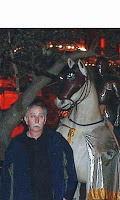
I call myself Papa Joe. I've loved science fiction and fantasy from the time I learned to read. When I was twelve or so, I discovered the pulp magazines. They had garish covers and were printed on blotting paper, but the insides were marvelous. In these magazines, and the slicks and paperbacks that followed a few years later, I learned to love such writers as Isaac Asimov, Ray Bradbury, Robert Heinlein, Robert Silverberg and so many others.
For most of my working life, I was a technical writer for a major computer firm. I learned many things there about computers, about writing and about people and corporations. I lived the Dilbert cartoon. Because of my work, my wife and I moved to a small town in upstate New York where the manufacturing plant was located. We still live there. Renaissance has published collections of my short stories, The Sands of Time, Mordrake's Apprentice, and Love Among the Stars, nine SF novels, The Isaac Project, For Love of Kumiko, Pawns of Tomorrow, Star Tower, Out of Time, Takeover, The Artifact , Pawns of Tomorrow, Knights of Tomorrow and The Bagod, dark paranormal fantasies The Laws of Magic, Castle Darkest Night and Dinner with Dracula, and my humorous fantasy series The Books of Retslu.
Find out more about Joe Vadalma
At his website:
The Fantastic World of Papa Joe
and his fantasy novel series and short stories: The Morgaine Chronicles & Raven Lenore, Psychic Investigator available from
Renaissance's Page Turner Editions Fictionwise Amazon
Published on January 23, 2011 08:48
January 19, 2011
Why I Write Fantasy - Alma Alexander
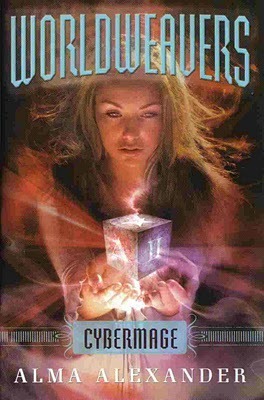 Welcome Alma Alexander, author of historical fantasy for young adults and "grown-ups"!
Welcome Alma Alexander, author of historical fantasy for young adults and "grown-ups"!Amber: Why do you write fantasy?
Alma: I think fantasy is the best shot at reality we've got. Things which you could not say in this our "real" world, wrongs which you could not right, opinions which must remain unsaid because of fear of persecution or retribution - all of this you can give, the bitter truths wrapped in the sweet pill of a fantasy world, and those who read this will take both in and understand them.
And then, of course, there's the sheerest joy of it all, creating your own world to play in and making its rules and then seeing others wander into it from the borders and start looking around and smiling.
Worldbuilding has always been one of the best things about writing a work of fantasy - one of the hardest things to do well, to be sure, but one that has always made me happy. I do not, it would seem, like the easy things in life - everything that's worth a damn has to be earned and I've enjoyed every moment of earning the joy of writing fantasy.
Amber: Why did you write historical fantasy?
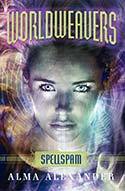
Alma: I like historical fantasy (Guy Gavriel Kay take a bow) because of the richness of the tapestry and the sense of "this could almost almost almost be real... and if it isn't or wasn't it damned well SHOULD HAVE BEEN..."
Amber: What are your favorite fantasy novels?
Alma: "Tigana", "Song for Arbonne", "Lions of Al-Rassan" (Guy Gavriel Kay); Glenda Larke's work; Marie Brennan's Onyx Court series; Tolkien; Zelazny's Amber books; Catherynne Valente's work; there are so many.
Amber: Why do you think readers love fantasy?
Alma: Because it lets them out of the traps of their mundane lives and lets them live something different, something bigger than themselves. It lets them read about, and believe in, magic. it lets them fly. It lets them dream. it lets them IMAGINE - imagine different, imagine greater, imagine more powerful, more poignant. The best fantasy isn't escapist
pablum that lets a reader slither into ignorance and the bliss of the lotus eaters - it's the kind with an edge, the kind that slices open the skin of our own reality and makes both the fantasy and the reality solid enough to make your mind sting and your sould bleed.
Amber: Would you write fantasy even if no one read it?
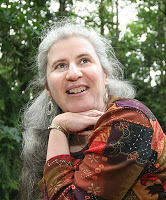
Alma: Yes!
Alma Alexander is a novelist who writes for both YA and
"grown-up" audiences - her books have been translated into 14 languages and sold in more than 20 countries worldwide so far. She lives in the Pacific Northwest region of the United States, with her husband and assorted visiting wildlife that passes through the wild cedar woods of her back yard. She is currently owned by two cats.
Information about Alma's books can be found at
http://www.almaalexander.com/biblio.php
And her author website.
And her Worldweavers website (YA series) Learn about her current project Rebirth of a Novel(a rewrite of a novel she wrote when at 14 - with the help of a team of teenage advisers) http://heritageofclan.wordpress.com
Published on January 19, 2011 06:22
January 16, 2011
Why I Write Fantasy - Cynthia Gael
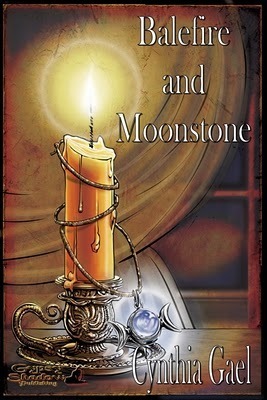 Welcome Cynthia Gael,
who shares her secret that she actually two fantasy writers, K.G. McAbee and Cynthia D. Witherspoon!
Welcome Cynthia Gael,
who shares her secret that she actually two fantasy writers, K.G. McAbee and Cynthia D. Witherspoon!
Amber: Why do you write fantasy?
CG: We write fantasy because of the infinite possibilities the fantasy genre offers for a writer. After all, where else can you write stories about witches and curses, magic, and Witchfinder Generals? And while we both write traditional fantasy, we don't restrict ourselves to it alone. We do urban fantasy, paranormal fantasy, steampunk—the list goes on.
Amber: How do you write fantasy as a duo?CG (KG): It's scary easy! We tend to think alike, to the point we often finish each other's sentences or come up with ideas, locations, even names the other one was just thinking of or getting ready to suggest. We're also open to negotiation. If one of us wants to go in a certain direction, the other is willing to give it a shot. But both of us have to agree on important things, like which Mexican restaurant is best for lunch. All in all—and this is K.G. speaking here—I cannot imagine a better collaborator than C.D. CD here ! I couldn't agree more with K.G. Before we began to write together, I was so sure that my craft was a solitary position. However, K.G. makes it so easy! Not only can she seem to read my mind, but its such fun to get her chapters to see what new aspects she has placed in a story. If you can find a great friend, whose also a legendary writer, and they want to work with you? Jump on the chance. You'll be sorry if you don't!
Amber: What are your favorite fantasy novels?
CG: Lord of the Rings; Zelazny's Chronicles of Amber; The Dresden Files; The Dragon and the George: Harry Potter; and Skulduggery Pleasant, and The Hunger Games, and and and….
Amber: Why do you think readers love fantasy?
CG: Readers love fantasy because it allows them the chance to escape the mundane world and become something more than what they are. A good fantasy writer will pull you into their world. But a great one will have you packing your luggage and moving in to stay.
Amber: Would you write fantasy even if no one read it?
CG: Absolutely. Sometimes, something gets lost when you say you're a writer. Most think it's for money (its not) or fame (nope, it's really not for that either). We write because it's our passion. It's in our blood. And our characters won't shut up until we get their ideas down on the page.
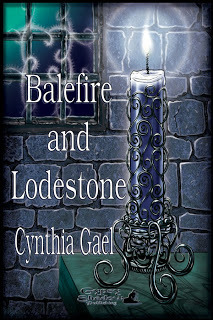 Cynthia Gael lives in South Carolina in a small log cabin built in 1817. She writes in a loft described to her, years before she saw it, by a psychic, thus influencing her already vast interest in psychic phenomena. Her other interests include: all forms of paranormal phenomena, history, literature, the literature of history, the history of literature, and dogs. She is a firm believer in magic in all its forms, thus she believes she's lived many times before. Cynthia often draws inspiration from these past lives, where she existed in ancient Egypt, medieval France and Victorian England, among other places and times.
Cynthia Gael lives in South Carolina in a small log cabin built in 1817. She writes in a loft described to her, years before she saw it, by a psychic, thus influencing her already vast interest in psychic phenomena. Her other interests include: all forms of paranormal phenomena, history, literature, the literature of history, the history of literature, and dogs. She is a firm believer in magic in all its forms, thus she believes she's lived many times before. Cynthia often draws inspiration from these past lives, where she existed in ancient Egypt, medieval France and Victorian England, among other places and times.
Cynthia Gael has one ultimate secret; she is actually two writers, K.G. McAbee and Cynthia D. Witherspoon—how's that for a split personality? While they both share the writing of the Cynthia Gael books, they also write their own novels and stories, and a passion for submitting to anthologies.
Be sure to explore the Balefire Universe further in
Book Two: BALEFIRE AND LODESTONE (coming soon)
and visit Cynthia Gael's website
And K.G. McAbee's website And Cynthia D. Witherspoon's
The Balefire Chronicles: Balefire and Moonstone (Gypsy Shadow Publishing)
If you have read Balefire and Moonstone, be kind enough to leave us a comment on either Amazon.com or BarnesandNoble.com and send us a note to say you've done so. We'll send you a personalized thank you card (a real one if you give us your address!) signed by Cynthia Gael herself.
Published on January 16, 2011 06:52
January 12, 2011
Why I Write Fantasy -Jennifer Allis Provost
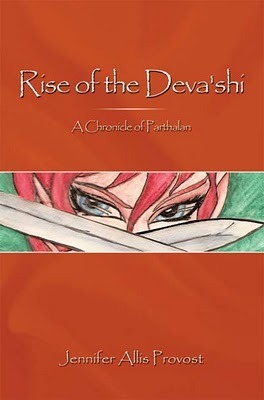
Welcome Jennifer Allis Provost, author of epic fairies fantasy!
Amber: Why do you write fantasy?
Jennifer: The main reason I write fantasy is to escape everyday life. When I was a child, I enjoyed nothing more than getting lost in a good book, and the more fantastical the plot the better. By writing the fantasy you get to create a world you'd like to live in.
Amber: Tell me about why you chose to write about fairies on an epic level? Jennifer: I've always been enamored by those stories where a normal girl (or boy) wakes up in a fantastic otherworld, like Alice falling down the rabbit hole. Wouldn't it be amazing if such doorways existed?
Amber: What are your favorite fantasy novels? Jennifer: The Hero and the Crown and The Blue Sword by Robin Mckinley. I first read The Hero and the Crown while I was in the fourth grade, and I go back to it every few years. Other early favorites were A Wrinkle in Time by Madeline L'Engle, The Chronicles of Narnia and The Once and Future King by T.H. White.As for newer works, I am completely in love with Jacqueline Carey's Kushiel series. I also recently enjoyed Graceling by Kristin Cashore – it reminded me of something I would write.
Amber: Why do readers love fantasy? Jennifer: I think people like reading it for the same reasons I write it – to escape. Consider the current influx of urban fantasies in your local bookstore. After a tough day at work, it's nice to read about a character whose problems include dragons and evil wizards. And hey, if the dragons and wizards can be conquered, so can that paper jam.
Amber: Would you write fantasy even if no one read it? Jennifer: Absolutely. Writing is who I am, not what I do.

Jennifer Allis Provost is a native New Englander who lives in a sprawling colonial along with a dog, two birds, three cats, and a wonderful husband who never forgets to buy ice cream. As a child, she read anything and everything she could get her hands on, including a set of encyclopedias, but fantasy was always her favorite. She spends her days drinking vast amounts of coffee, arguing with her computer, and avoiding any and all domestic behavior.
Find out more about Jennifer's Rise of the Deva'shi: A Chronicle of Parthalan
Kindle Her Website And her Blog
Smashwords Find other works at Smashwords
Published on January 12, 2011 07:44
January 9, 2011
Why I Write Fantasy -James Dorr
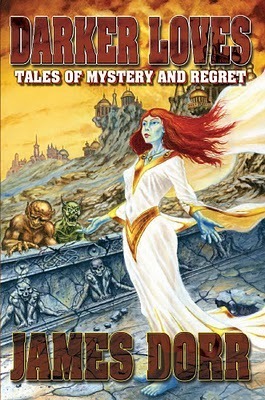
Welcome James Dorr, short story fantasy author!
Amber: Why do you write fantasy?
James: I write dark fantasy and horror primarily, though with a bit of science fiction and mystery from time to time too. I enjoy stretching my -- and readers' -- imagination by looking beyond the surface realism of the things around us, perhaps to find inner, deeper, more universal meanings. I also enjoy exploring beliefs, mine and those of others, and working with characters under stress when those things believed prove no longer to be true.
Amber: You say you write primarily darker shades of fantasy. What are some of your favorite books?
James: I was asked that question once on a horror panel and, without hesitation, cited Dracula. Bram Stoker generally wasn't that good a writer, but in this case he got everything to work perfectly for him: a genuine mystery as we, though a series of journal entries, newspaper accounts, letters, etc., attempt with the characters to piece together what's happening; fantasy; adventure; horror (and people weren't as complacent then about vampires not existing -- in Austria 150 years before, the equivalent time for us between now and the Civil War, reports were taken seriously enough to bring out the army); and even science fiction. More broadly, I'd cite The Complete Greek Tragedies: Aeschylus, Sophocles, and Euripedes. These were among the first works of literary horror and still stand with the best. For other authors who've influenced me, I'd add Edgar Allan Poe (The Complete Tales and Poems), Ray Bradbury, Bertolt Brecht (real-world societal horror reset in [to him] semi-mythical places like China and the USA, but also the idea of "epic theatre" and how it relates to old forms like fairy tales). The list goes on....
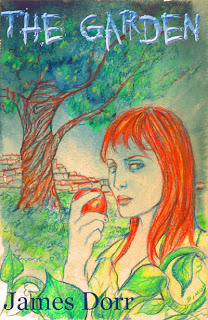 Amber: Why do you think readers love fantasy?
Amber: Why do you think readers love fantasy? James: I suspect for much the same reasons I do: To be taken to places outside one's usual sphere of activity, be it another part of this world or one entirely of the imagination. Or perhaps to be taken to one's inner self, at least to catch a glimpse or two of what may lurk there. The neat thing about fantasy is that you can, ideally, give (and get) both.
In a broader sense, I think readers in general like to think, to add their own imaginations to what the author has offered. In that way reading, especially in speculative genres like science fiction, fantasy, and horror, becomes a dynamic experience, unlike, say, watching movies or TV which are tailored to a more passive reception.
Amber: Would you write fantasy even if no one read it?
James: That's a difficult question. I write what interests me, certainly, but I also wish to share my work with others. When I was younger I enjoyed reading the work of others, so maybe I'm paying forward in some sense, to plant the seed to write to at least a few of those ahead of me. In that way maybe writing is a kind of contract between writer and reader which would be incomplete without both parts. I have written stories that never sold and yet that I don't regret having written, but that doesn't mean I haven't stopped sending them around, at least occasionally. But taken literally, if I were in some place where no one else who could read (or be read to) existed, a desert island with no chance to be visited by explorers even centuries after, surrounded by currents that guaranteed any manuscript tossed out in a bottle would sink before it could reach any shore, I really don't know. (I might "make up" stories, but I have a notion I might prefer to spend my time constructing a flute to make music instead. Or possibly paint pictures on cave walls -- that is, I think there might be something even more fundamental than stories that I might seek to let out through art.)
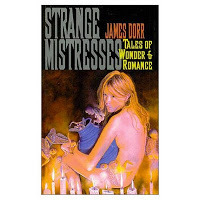 James Dorr is a short story writer and poet with two collections, Strange Mistresses: Tales of Wonder and Romance and Darker Loves: Tales of Mystery and Regret, published by Dark Regions Press (www.darkregions.com). He also has a novella, The Garden, available in electronic and print chapbook form from Damnation Books, LLC, along with several hundred appearances in magazines and anthologies ranging from Aboriginal Science Fiction and Alfred Hitchcock's Mystery Magazine to Xenophilia and The Yellow Bat Review. Dorr has worked a number of jobs including technical writer, city editor on a regional magazine, full time freelancer, and semi-professional musician, and now resides in southern Indiana with one cat, Wednesday, and a full-size book of poetry, Vamps (A Retrospective), due out in 2011 from Sam's Dot Publishing.
James Dorr is a short story writer and poet with two collections, Strange Mistresses: Tales of Wonder and Romance and Darker Loves: Tales of Mystery and Regret, published by Dark Regions Press (www.darkregions.com). He also has a novella, The Garden, available in electronic and print chapbook form from Damnation Books, LLC, along with several hundred appearances in magazines and anthologies ranging from Aboriginal Science Fiction and Alfred Hitchcock's Mystery Magazine to Xenophilia and The Yellow Bat Review. Dorr has worked a number of jobs including technical writer, city editor on a regional magazine, full time freelancer, and semi-professional musician, and now resides in southern Indiana with one cat, Wednesday, and a full-size book of poetry, Vamps (A Retrospective), due out in 2011 from Sam's Dot Publishing. For more information on his work and upcoming projects of James Dorr, please feel free to have a look at his website.
Comments are welcome.
Published on January 09, 2011 09:57
January 5, 2011
Why I Write Fantasy -Trisha Wooldridge
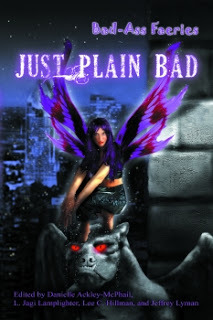 Welcome Trisha Wooldridge, fantasy author who writes fantasy with help from her faeries!
Welcome Trisha Wooldridge, fantasy author who writes fantasy with help from her faeries!
Amber: Why do you write fantasy?
Trisha: I've always loved fantasy. It most likely started with unicorns, because, since they were magic, they were more likely to show up in my back yard than an actual horse, and their powers would let me hide it from my parents and somehow keep it on my $1 a week allowance. I would also be able to ride a unicorn despite being a klutz who wanted to cry every gym class due to aforementioned super-magickal powers.
If you think about it, though, most of children's programming - and I watched only Sesame Street and Mr. Rogers' Neighborhood - were contemporary fantasy. You had friendly monsters, talking animals, a train to take you to an entirely different universe, all in familiar neighborhood or city settings. And if you did the right thing and learned everything you needed to learn, good things would happen.
On some days, I write fantasy - particularly contemporary fantasy - because I'm still looking for those fantastic experiences in my everyday life. I keep a faerie garden, for example, with herbs, statuary, and shiny things just in case they might show up (or have, I just haven't been deemed worthy to see them yet.) Other days, I write fantasy even though I'm cynical and have lost some faith, but the thought of inspiring someone else to live a better life, be happier, feel a sense of catharsis, and touch something magical makes it real on a psychological and emotional level. And then there are the days when characters just show up in my head and won't leave me alone until I at least take notes about their stories - which, of course, happen to be pretty fantastical. Amber: Why Faeries?
Trisha: Like with my own mixed relationship with fantasy, faeries mean many things. Some days I believe that there are physical beings we call faeries. Other days, faeries are just powerful metaphors for how we relate to the environment beyond our understanding.
Regardless, they are still real in the sense they affect our relation to the world around us, our psychology, our spirituality, our emotions - and even our physical bodies. Faeries are powerful. And they have so much potential!
In ancient times and in current ancient beliefs, they are manifestations of elements and nature. Another set of beliefs, surviving over a thousand years, is that they are the angels who took no side in the War in Heaven - angels, dewinged, cast to live beside humans but without the soul. Yet another way humans see faeries are the beings that cause the unexplainable: why an infant colics for no reason, why a WW2 plane or car just stops working, why that important email just disappears from the inbox.
Faerie fill in the spaces between humans and the world in which we live - and those spaces are infinite.
Amber: What are your favorite fantasy novels?
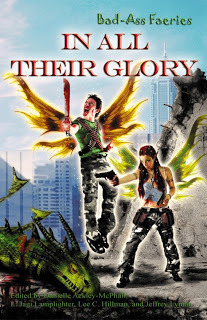 Trisha: At the top of my fantasy novel list would be Neil Gaiman's American Gods because I love the mythos and the accountability of humans who brought to life their own powerful beliefs, breathed them life… and now must answer to those beliefs. Other novels I could read over and over would be Mercedes' Lackey's SERRAted Edge and Bedlam Bards series. I adored J.K. Rowling's Harry Potter series, and I'm also a fan of Rick Riordan's Percy Jackson series.
Trisha: At the top of my fantasy novel list would be Neil Gaiman's American Gods because I love the mythos and the accountability of humans who brought to life their own powerful beliefs, breathed them life… and now must answer to those beliefs. Other novels I could read over and over would be Mercedes' Lackey's SERRAted Edge and Bedlam Bards series. I adored J.K. Rowling's Harry Potter series, and I'm also a fan of Rick Riordan's Percy Jackson series.That said, some of the most influential fantasy came during high school where I devoured all of the high fantasy, D&D-esque pulp of Forgotten Realms and DragonLance novels. I still love them; they were my gateway drug - the peanut-butter and jelly experiments that got me into Joy of Cooking. While I've found I love contemporary/urban fantasy most, there's nothing like the comfort of escapism that those high fantasies delivered.
Amber: Why do readers love fantasy?
Trisha: There's at least a certain level of escapism for almost everyone, I believe, and a certain desire to touch a little magic within the mundane. Ghost hunting and snapping pictures of faeries draw a lot of people who, like Mulder of the X-Files, just want to believe. There's a lot of SF/F crossover in fandom, so there's a desire to believe in something. Or at least imagine the potential of magic, otherworldlieness, anything but the dredge - if not abuse - that a lot of us go through on a daily basis.And while there are dystopic fantasies, most fantasy has a certain level of justice. The good, the smart, the kind ones get rewarded. The victims see relief and abuses returned upon abusers. The evil are punished - often quite more severely than we can do in this world. In a fantasy book, there is promise that a quest will be fulfilled, a problem solved, and balance restored. In real life, those awful patrons abuse their server or store clerk or service representative, and damnit if they don't get their free meal, return exchange, or whatever the hell they want, while the person who suffers their abuse might get docked in pay, lose their job, or some other injustice. The bullies at school? Come reunion most are still bullies in jobs that reward their awful behavior with fabulous pensions. In a fantasy book, they either learn their lesson or they might get dragged into a version of Hell. Fantasy makes up for what life may never - and may never be able to - deliver. Amber: Would you write fantasy even if no one read it?
Trisha: Absolutely! I have reams and reams and notebooks and art pads of stuff that may never ever be seen by another person. In my head, I've got more storylines than I can ever get down on paper. Of what I can get down, not all of it is publishable. Some is very private to start with - but I have to write it down. I need to experience that magic of the story flowing from my head into my fingers and onto the page.
Of course, for all I know, it may be unearthed in another century… or the faeries are reading over my shoulder.
Amber: Thanks for being my guest on Wordshaping.
Trisha: Amber, once again, thank you very much for having me! I love your blog, and I love what you're doing to help promote fantasy writers. :) Thank you!
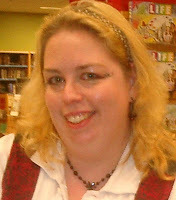 Trisha J. Wooldridge is a freelance writer, editor and educator from Auburn, MA and a member of the Broad Universe Motherboard. Her experience ranges from Dungeons & Dragons Online to animal rescue public relations. She writes about food, wine, horses, haunted locations, education, and she interviews bands like Voltaire, Within Temptation and Nightwish. Her novella, "Mirror of Hearts," was at FANTASY GAZETTEER, and short story, "Party Crashers," co-authored with Christy Tohara, in the EPIC Award winning BAD-ASS FAERIES: JUST PLAIN BAD (Marietta 2008, Mundania 2009), with a second co-authored short story in the EPIC 2010 finalist BAD-ASS FAERIES: IN ALL THEIR GLORY (Mundania 2010).
Trisha J. Wooldridge is a freelance writer, editor and educator from Auburn, MA and a member of the Broad Universe Motherboard. Her experience ranges from Dungeons & Dragons Online to animal rescue public relations. She writes about food, wine, horses, haunted locations, education, and she interviews bands like Voltaire, Within Temptation and Nightwish. Her novella, "Mirror of Hearts," was at FANTASY GAZETTEER, and short story, "Party Crashers," co-authored with Christy Tohara, in the EPIC Award winning BAD-ASS FAERIES: JUST PLAIN BAD (Marietta 2008, Mundania 2009), with a second co-authored short story in the EPIC 2010 finalist BAD-ASS FAERIES: IN ALL THEIR GLORY (Mundania 2010).More about Trisha and her Writing:
BAD-ASS FAERIES: JUST PLAIN BAD and BAD-ASS FAERIES: IN ALL THEIR GLORY are anthologies put out by the excellent Mundania Press. I'm so honored to share the pages the wonderful group of writers in each book. I'd also love to say that working with the editors of the anthologies was an excellent lesson in writing, and lead editor, Danielle Ackley-McPhail, who has taught me so much about promoting oneself and one's books. She and the other editors have even put together a website for the series: www.badassfaeries.com with a lot of Easter Egg type extras for anyone who stops in.
She has also published a poetry chapbook of the speculative and fantastic, which includes the urban fantasy epic, "The Unicorn and the Old Woman." Get the chapbook, "The Unicorn and the Old Woman" from her website.For anyone interested in my musing and writing tips (along with some horse-adventures since I haven't gotten my own unicorn, yet - but I do have a horse!), feel free to peruse my blog: http://novelfriend.blogspot.com
She also hosts a podcast for Broad Universe that often features fantasy excerpts from women writers. November featured Dragons & Magical Beasts, December featured a theme of Light overcoming Darkness, January will feature Faith and Fear, and February is Romance! Listen in at http://broadpod.posterous.com
Trisha's ContestLeave a comment for a chance to win a pdf
of one of her stories"Late Gate to Faerie"
from the 2011 EPIC award-nominated
Bad-Ass Faeries 3 anthology.
Published on January 05, 2011 07:41
January 2, 2011
Why I Write Fantasy - Denise Golinowski
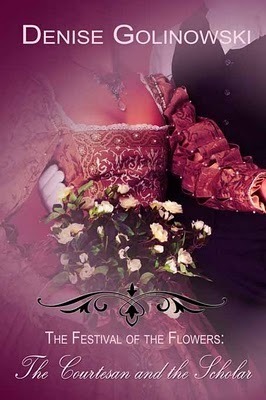 Welcome Denise Golinowski, author of magical worlds of fantasy and romance!
Welcome Denise Golinowski, author of magical worlds of fantasy and romance!Amber: Why do you write fantasy?
Denise: The mystical and mythic just resonate for me and when I took up a pencil, it's what came naturally to me. As they say, we are what we read--okay, I tweeked that a little, but you know what I mean. I've always read fantasy, so that's what I know best. I love to create new worlds to wander through with my characters as my guides. Fantasy allows me to blend cultures, social systems, settings, all to suit the needs of my characters and the story. My fantasy worlds are low-tech, more about the interconnectivity between humans and nature. It's all about exploring relationships in simpler worlds, not easier, just less congested and less distracting.
When I began The Festival of The Flowers: The Courtesan and The Scholar, I wanted to explore a cursed love in an elegant and stylized world. The professional companions guild, the city of Valgate and The Festival of The Flowers evolved from Lisara's being a woman with siren's blood and a family curse. I needed a world where she could learn to control and use her gift. The characters who came into the Festival with supporting roles have now evolved into their own stories which I'm trying once more to capture on paper.
Amber: What are your favorite fantasy novels?
Denise: Marion Zimmer Bradley's Avalon series - I know there have been countless re-weavings of the Arthur mythos, but Marion's drew me in and held me captive. Her books explore and expand that world with such beauty and depth.
Piers Anthony's Incarnations of Immorality - His personifications of the 7 major aspects of humanity were amazing--Death, Fate, Time, War, Gaia, Evil and Good. The way he wove them all around a central event, bringing us all into that event from all point of views, allowed us to see how everything is interconnected, while exploring the "powers" of each specific Incarnation.
Jim Butcher's Dresdin Files, Harry Potter (natch), Jacqueline Carey's first three Kushiel books, Rachel Caine's Weather Wardens, Carrie Vaughn's Kitty series. I'd better stop there, I could go on for pages.
Amber: Why do you think readers love fantasy?
Denise: Escapism is my immediate response followed closely by the thought that perhaps fantasy offers readers the chance to explore scary or personal themes in safe settings. When you can say it's all make-believe, it's easier to release old expectations and accept a new set of expectations.
Amber: Would you write fantasy even if no one read it?
Denise: Absolutely. That pretty much sums it up. I've always written fantasy, I am writing fantasy, and I always will write fantasy. It's what I do.
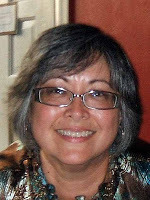 More about Denise Golinowski -I'm a mild-mannered office manager by day and an unabashed scribbler by night. I've been writing since I can remember. However, I didn't get "serious" about it until about 2000. I've had several short stories published and when The Wild Rose Press published my novella, The Festival of The Flowers: The Courtesan and The Scholar, I was, and still am, thrilled to death. I'm a member of the Romance Writers of America, the Virginia Romance Writers and several very wonderful critique groups. I live in Central Virginia with my super-supportive husband, Joe, and two less enthusiastic cats, Lovejoy and Serena.
More about Denise Golinowski -I'm a mild-mannered office manager by day and an unabashed scribbler by night. I've been writing since I can remember. However, I didn't get "serious" about it until about 2000. I've had several short stories published and when The Wild Rose Press published my novella, The Festival of The Flowers: The Courtesan and The Scholar, I was, and still am, thrilled to death. I'm a member of the Romance Writers of America, the Virginia Romance Writers and several very wonderful critique groups. I live in Central Virginia with my super-supportive husband, Joe, and two less enthusiastic cats, Lovejoy and Serena. Find our more about The Festival of The Flowers: The Courtesan and The Scholar The Wild Rose Press
Learn more about Denise at her blogGolinowski's Gambol - Fantasy with A Kiss of Romance
Published on January 02, 2011 06:30
December 26, 2010
Why I Write Fantasy -Lyndi Alexander & Her Elves!
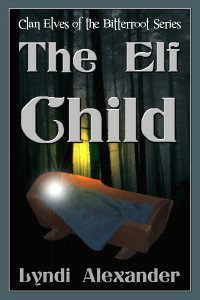
Welcome Lyndi Alexander, urban fantasy author who discovered elves living in Montana!
Amber: Why do you write fantasy? Lyndi: I really enjoy writing fantasy because I can push the "what if" envelope outside normal boundaries. Fantasy is also a perfect format to showcase weird and quirky characters, which seem to trail around behind me like dropped crumbs. Being "different" is an asset when you're working with a situation that's out of the norm. I have three children with special needs, one with ADD, one with autism and one with Asperger's, and I like to consider their differences as assets, rather than detriments. The Elf Queen has not only barista Jelani Marsh, but her WoW-playing computer geek friend Lane, his roommate paranoid child abuse survivor 'Crispy,' and their social worker friend Iris, as well as a host of elves with various skills and talents. It takes cooperation among all these diverse folk to make the magic come together.
Amber: How do you work elves into urban fantasy?Lyndi: I have to admit, elves were new for me, but I knew I didn't want to use the traditional "elves, faeries and leprechauns" kind of elves. Though these elves come from a time beyond the existence of humans in the mountains of Montana, they co-exist with humans. They are the same size, shape and can blend in quite well if they have to. In my story, they've been forced to live in the human city by an ongoing schism in the elf clan, and what they want more than anything is the chance to return to the natural world. When the clan is functioning well and in harmony, then nature is also harmonious, the environment healing itself and the world a better place for it.
Amber: What are your favorite fantasy novels?
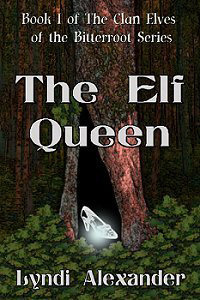 Lyndi: Anne McCaffrey's dragon books, by far. I love her world-building, the way her series carries the characters forward and adds and expands with new and side characters. We share the same birthday--April 1. I hope that's lucky!
Lyndi: Anne McCaffrey's dragon books, by far. I love her world-building, the way her series carries the characters forward and adds and expands with new and side characters. We share the same birthday--April 1. I hope that's lucky!Amber: Why do readers love fantasy? Lyndi: As readers, I believe we want to escape from our own realities, the stack of dirty dishes, the blather of talking heads on TV, the kids, the spouse, the empty, quiet rooms. Fantasy gives the reader a two-fer, in my opinion; not only can they find a fine story, but they can move into a realm of something that is not necessarily of this time or this world and stretch their minds with the author's imaginative tales.
Amber: Would you write fantasy even if no one read it? Lyndi: I would. *L* My stories get written because they come to me. I don't set my brain for "Today I'm going to write a vampire story." Instead, I see what stories are inside, waiting to get out, and then I write them. Several reviewers have said that The Elf Queen is not a typical fantasy, and I'm glad to hear that, because I don't want to feel like I'm trapped in a genre formula.
Lyndi Alexander (aka Barbara Mountjoy) has been a published writer for over thirty years, including seven years as a reporter and editor at a newspaper in Homestead, Florida. Her list of publications is eclectic, from science fiction to romance to horror, from tech reporting to television reviews. Lyndi and her absent-minded computer geek husband have a dozen computers, seven children, and a full house in northwestern Pennsylvania.
The Clan Elves of the Bitterroot series is published by Dragonfly Publishing, Inc..
Visit The Clan Elves of the Bitterroot website
The Elf Child , The next book in the series, will be out in spring 2011, & The Elf Mage in 2012.
Lyndi's"Be An Elf" ContestLeave a comment for a chance to be an elf character in book three of the Clan Elves series.The winner can be an elf in the big battle and can choose what power/talent he or she has at their disposal.
Learn more about Lyndi and Barbara on her writer's blog.
And her blog Awalkabout's Weblog about autism, science fiction and life
Published on December 26, 2010 07:53
December 23, 2010
Christmas on Wherever Island - Now for the Nook!
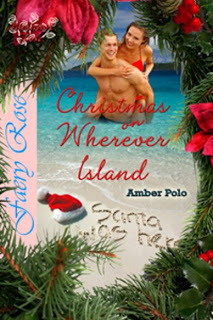
Fly Off to a Caribbean Island for Christmas?
Christmas on Wherever Island by Amber Polo
A Magic Santa brings Caribbean Christmas Joy!
Marti Bell is facing the prospect of a very unmerry Christmas. Reluctantly, leaving her married lover she travels toward ice, snow, and judgmental family until a magic Santa sends her to a surprise destination in the warm waters of the Caribbean.
Wherever Island would be a winter paradise except the only place to stay is the beachside cottage of romantic globetrotting photographer Cliff Holmes. Cliff wants to unwind and treat Marti to a little romantic Caribbean Christmas fun but she's determined to stay in the warm ocean and out of hot water.
Watch the Christmas on Wherever Island book video
"Not only is the setting sensational, the hero will sweep you off your feet…this is one story I can read every Christmas season. …a great happily ever after story."
A "You Gotta Read" fro m You Gotta Read Reviews. Reviewed by Roberta
Buy the ebook of Christmas on Wherever Island Now for your nook!
& Other ebook formats
Published on December 23, 2010 07:48
December 19, 2010
Why I Write Fantasy - Tracy Morris
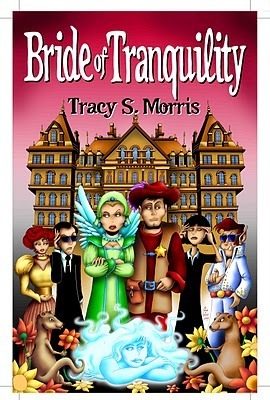 Welcome Tracy Morris, author of urban fantasy mysteries!
Welcome Tracy Morris, author of urban fantasy mysteries!Amber: Why do you write fantasy?
Tracy:Tracy: When I started writing, I was drawn to reading fantasy. There were plenty of non-fantasy books that we were expected to read in school, such as the Newbery Award winners like Sarah, Plain and Tall and Dear Mr. Henshaw. These books never engaged my imagination. I didn't go
home after school and pretend that I was Sarah from the book, or Anne from Green Gables. I wanted to be a Dragon Rider from one of Anne McCaffery's books or Alice having an adventure through Wonderland or Dorothy with magic shoes that could transport her anywhere with a click of her heels (though never Wendy. In the books she only got to play mother and clean up after the lost boys and fix their socks and she ended up tied to the mast of the pirate ship instead of getting to fight the pirates).
I didn't really care for the problems that the girls in the mainstream books faced. I didn't want to read about the girl who was bullied in school (or perhaps I identified too well). I thought books should be an escape into a world where I could be the hero and slay the dragon and solve problems that I couldn't seem to solve in the real world.
When I started writing, it was an extension of the fantasy worlds I already invented. The heroes and heroines of my stories were an extension of myself. And, unlike me as a pre-teen and teen, they were always able to solve their own problems.
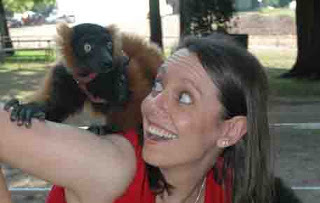
Amber: What are your favorite fantasy novels?
Tracy: The ones with strong heroines and heroes who take on a problem and solve it believably. I know that sounds funny, since it is fantasy. But at the root of every fantasy are human characters with human motivations. I love reading Terry Pratchett because his characters are recognizably and believably human. He may write about wizards, but they still worry about getting tenure in the wizarding classes that they teach and the score of the most recent soccer game.
Amber: Why do you think readers love fantasy?
Tracy: I think readers are drawn to fantasy for the escapism. Fantasy can be a place where they can ride along as an unseen extra character on a grand adventure. You can be right there with Frodo as he climbs Mount Doom. That's why when some of the largest, most beloved fantasies are brought to the big screen, there is intense scrutiny and fan outcry. Particularly if the fantasy portrayed isn't a close match to the
fantasy that the reader has in their head.
I think that's why big budget fantasies like Lord of the Rings were so successful. The fantasy that was put on the screen was obviously a loving and faithful adaptation of the novel series. It's also why inconsistencies with the book, like the missing Tom Bombadill subplot were remarked on by fans. When you make a film adaption of a classic like that, you're challenging every fan's personal fantasy.
Amber: Would you write fantasy even if no one read it?
Tracy: I think most writers would. Writing is like a compulsion that most writers can't deny. They will often go without hobbies, television or necessities in order to be able to write. That's why a lot of us are still at it in the face of daunting odds.
Tracy S. Morris is a self-described kamikaze speller who is blessed, thrilled and occasionally befuddled that someone actually pays her to write.
She is the author of the Tranquility series of urban fantasy mysteries. The most recent, Bride of Tranquility is a murder mystery set in a haunted hotel during a Renaissance wedding.
The series is available in paper format from Yard Dog Press, or in E-Format from Baen books.Additionally, the Tranquility series is available in paper format at Yard Dog Press.
Pre-Christmas Sale Baen is running a special on
Tracy's e-book series. Both Yard Dog Press series released through Baen have been bundled together& offered for $20.Including Tranquility & Bride of Tranquility as well as The Four Redheads of theApocalypse & The Four Redheads: Apocalypse Now!
Also anyone who buys a copy of either Tranquility or Bride of Tranquility directly from my publisher, Yard Dog Press between now and Christmas, I will send them a "free preview" of the first two chapters of the third novel in the series, It Came To Tranquility , which I am now in the process of writing.
Order from Yard Dog Press
Tracy's contestLeave a comment for a chance to win a copy of Bride of Tranquility.
Published on December 19, 2010 08:08



